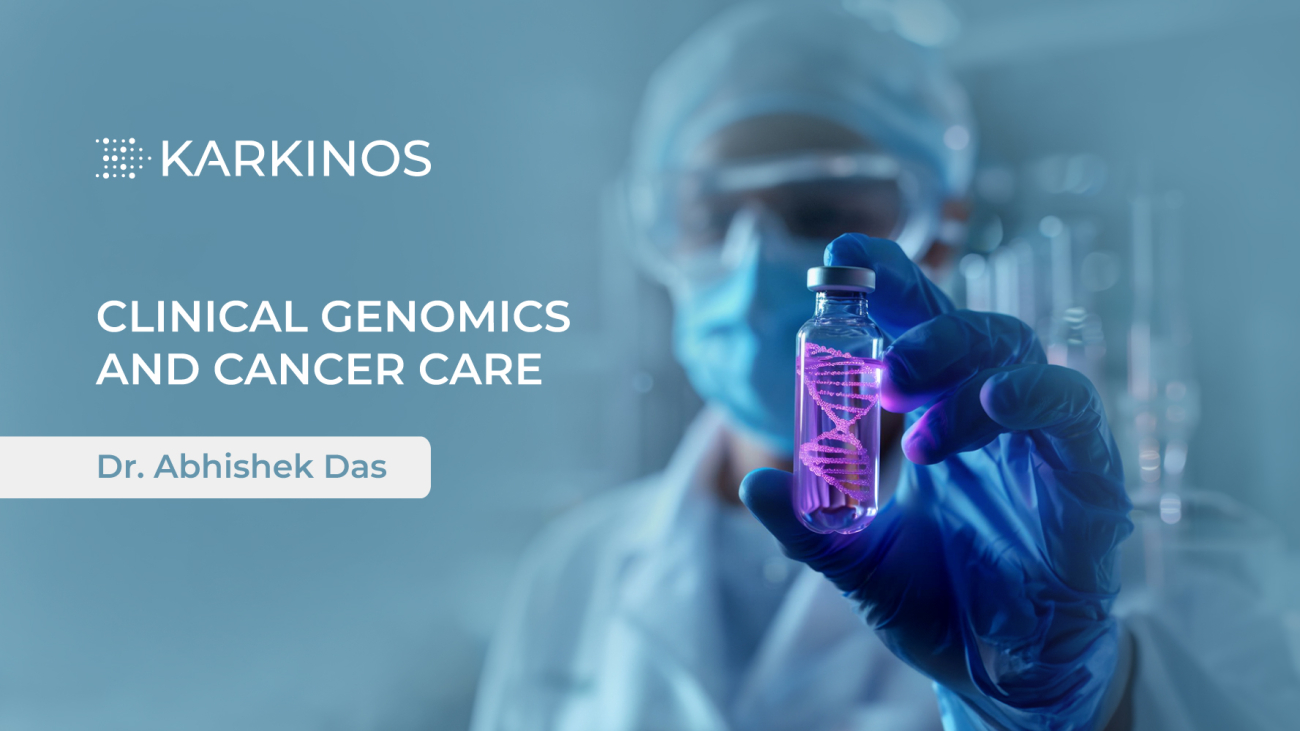The power of clinical genomics in cancer diagnosis and treatment
By Dr. Abhishek Das, Associate Bioinformatician, Karkinos Healthcare
Clinical genomics is a swiftly evolving field that merges genomic data with clinical insights to enhance patient care, diagnosis, and treatment strategies. By examining an individual’s genome, healthcare professionals can identify genetic variations that influence disease risk, drug responses, and other health-related characteristics. This approach transforms how we comprehend human health and disease, paving the way for more precise and personalized medical practices [1].
The Human Genome and Its Significance
The human genome encompasses the complete set of DNA, containing all the necessary genetic information required to build and sustain an organism. Comprising roughly 3 billion base pairs and between 20,000 and 25,000 genes, it encodes proteins and other functional components [2]. Variations in an individual’s genome can lead to differences in physical traits, disease susceptibility, and medication responses.
Genomic variations appear in multiple forms, including:
- Single nucleotide polymorphisms (SNPs): These are the most common form of genetic variation involving a single base change in the DNA sequence. Their impact on health can vary.
- Insertions and deletions (indels): These involve the insertion or deletion of small sections of DNA.
- Copy number variations (CNVs): Larger portions of the genome that are either duplicated or deleted.
- Structural variants: These encompass large-scale changes in the genome’s structure, such as translocations, inversions, or chromosomal duplications.
The Role of Genomics in Medicine
Clinical genomics extends beyond genome understanding by applying this information in medical settings to tackle various challenges, from diagnosis to treatment planning.
1. Genetic Testing and Diagnosis
Advancements in genome sequencing have revolutionized diagnostic possibilities. Genetic tests now enable the identification of inherited disorders, cancer predispositions, and other previously undiagnosable genetic conditions. For example, diseases like cystic fibrosis or Huntington’s disease can be diagnosed by detecting specific mutations [1]. In cancer care, genomic testing is crucial for categorizing tumors by genetic mutations and facilitating personalized treatment strategies [3].
2. Personalized Medicine
A significant breakthrough in clinical genomics is its role in personalized medicine. By analyzing a patient’s genetic profile, healthcare providers can predict medication responses, reducing the likelihood of adverse drug reactions and optimizing treatment effectiveness. For example, pharmacogenomics—a field studying how genes influence drug responses—helps tailor medication prescriptions, such as determining appropriate doses for blood thinners like warfarin based on genetic markers [4].
3. Cancer Genomics
Clinical genomics has significantly impacted cancer care. As cancer develops due to genetic mutations, identifying these mutations is crucial for accurate diagnosis, prognosis, and treatment. Tumor genomic profiling allows for targeted therapies that specifically address the mutations driving cancer progression. This approach has led to successful therapies for cancers like breast, lung, and colorectal cancer, where medications are designed to target specific genetic alterations [5].
4. Rare Diseases
Clinical genomics is vital in diagnosing and understanding rare diseases, many caused by genetic mutations. Whole-genome or whole-exome sequencing can uncover the genetic basis of rare conditions that elude traditional diagnostic methods. This not only aids in diagnosis but also enhances understanding of disease mechanisms and potential treatments [6].
Genomic Data Analysis and Interpretation
While genome sequencing produces vast amounts of data, the challenge lies in analyzing and interpreting this information to derive clinically meaningful insights. Bioinformatics and computational tools are essential for identifying relevant genetic variants, assessing their functional impact, and integrating genomic data with clinical information [1].
Advanced algorithms, including machine learning techniques, are increasingly being used to predict disease risk, identify biomarkers, and guide treatment decisions [3].
Ethical and Privacy Considerations
The integration of genomic data into healthcare introduces ethical and privacy concerns. Genomic information is deeply personal, and improper handling could lead to discrimination in areas like employment and insurance. Safeguarding patient privacy and establishing policies to regulate the use of genomic data is critical.
Additionally, ethical debates continue regarding the scope of genetic testing and the management of incidental findings—unrelated genetic variants uncovered during testing [7].
Future Directions
The future of clinical genomics holds significant promise for advancing healthcare. As the cost of genome sequencing continues to decrease, it is anticipated that genome sequencing will become a routine aspect of medical care, offering insights into not only rare diseases and cancers but also common conditions like heart disease, diabetes, and mental health disorders. Combining genomics with other omics technologies, such as transcriptomics, proteomics, and metabolomics, will provide a more comprehensive understanding of health and disease mechanisms [1].
Moreover, breakthroughs in gene-editing technologies, such as CRISPR, can directly target and correct genetic mutations, potentially offering new treatments for previously untreatable genetic disorders [6].
Conclusion
Clinical genomics is revolutionizing modern medicine by providing a deeper understanding of the genetic basis of disease, enabling personalized and precise approaches to treatment and prevention. Integrating genomic data into clinical practice can improve health outcomes, reduce healthcare costs, and transform the landscape of medicine. However, data interpretation, privacy, and ethics challenges must be addressed as the field continues to evolve.
References
- Ginsburg, G.S., Willard, H.F. (2011). “Genomic and personalized medicine: foundations and applications.” Clinical Pharmacology & Therapeutics, 89(3), 379-386. https://doi.org/10.1038/clpt.2010.279
- International Human Genome Sequencing Consortium. (2001). “Initial sequencing and analysis of the human genome.” Nature, 409(6822), 860-921. https://doi.org/10.1038/35057062
- Manolio, T.A., Chisholm, R.L., Ozenberger, B., et al. (2013). “Implementing genomic medicine in the clinic: the future is here.” Genetics in Medicine, 15(4), 258-267. https://doi.org/10.1038/gim.2012.157
- Relling, M.V., Evans, W.E. (2015). “Pharmacogenomics in the clinic.” Nature, 526(7573), 343-350. https://doi.org/10.1038/nature15817
- Garraway, L.A., Verweij, J., Ballman, K.V. (2013). “Precision oncology: an overview.” Journal of Clinical Oncology, 31(15), 1803-1808. https://doi.org/10.1200/JCO.2012.45.1411
- Ashley, E.A. (2016). “Towards precision medicine.” Nature Reviews Genetics, 17(9), 507-522. https://doi.org/10.1038/nrg.2016.36
- Van El, C.G., Cornel, M.C., Borry, P., et al. (2013). “Whole-genome sequencing in health care: recommendations of the European Society of Human Genetics.” European Journal of Human Genetics, 21(6), 580-584. https://doi.org/10.1038/ejhg.2013.46

 Dr. Abhishek Das is an accomplished Bioinformatician with extensive functional and clinical genomics expertise. He holds a Ph.D. in Biological Sciences from CSIR-Indian Institute of Chemical Biology, Kolkata, focusing on Next Generation Sequencing (NGS) data analysis. His work integrates statistical methodologies with AI/ML techniques to derive impactful insights in genomics. Dr. Das has authored several peer-reviewed publications and has actively participated in international conferences, making significant contributions to bioinformatics.
Dr. Abhishek Das is an accomplished Bioinformatician with extensive functional and clinical genomics expertise. He holds a Ph.D. in Biological Sciences from CSIR-Indian Institute of Chemical Biology, Kolkata, focusing on Next Generation Sequencing (NGS) data analysis. His work integrates statistical methodologies with AI/ML techniques to derive impactful insights in genomics. Dr. Das has authored several peer-reviewed publications and has actively participated in international conferences, making significant contributions to bioinformatics.